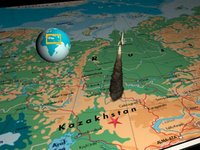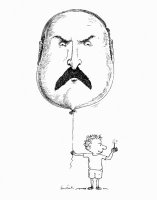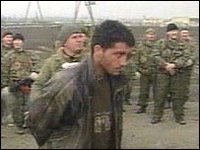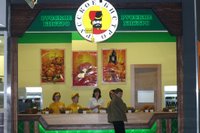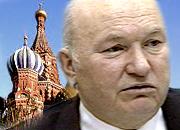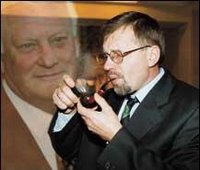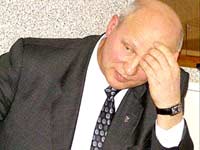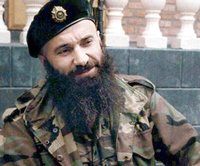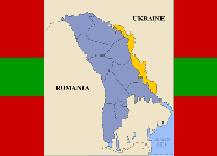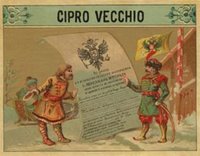 "Shut up! It's a hold-up, not a Botany lesson. Now, no false moves please. I want you to hand over all the lupins you've got." Thus said the highway-robber Dennis Moore in the absurd Monty Python sketch by the same name. Taking from the rich - giving to the poor, Moore contributes to socioeconomic redistribution by robbing lupins (la. Lupinus polyphyllus). The mere thought of robbing flowers is a masterpiece of absurdity, but what few know is that reality presents an even more absurd historical parallel.
"Shut up! It's a hold-up, not a Botany lesson. Now, no false moves please. I want you to hand over all the lupins you've got." Thus said the highway-robber Dennis Moore in the absurd Monty Python sketch by the same name. Taking from the rich - giving to the poor, Moore contributes to socioeconomic redistribution by robbing lupins (la. Lupinus polyphyllus). The mere thought of robbing flowers is a masterpiece of absurdity, but what few know is that reality presents an even more absurd historical parallel.In the 1930s, the racist Nazi ideology transformed all walks of German life - and so also biology. When historians today speak about racial biology, they usually refer to the absurd idea of purifying human races, motivated by a belief in the superiority of their own race, as for example the Aryan race in Nazi Germany in the 1930s and 1940s. What we today often fail to realise is though the full meaning of racial biology in Nazi totalitarianism. As the word indicates, totalitarianism signifies the full ideological control of a society in all respects. Therefore, even flowers and plants fell victim to Nazi ambitions of racial and genetic purification.
The idea was to genetically develop grain, vegetables and fruit, so that they would yield increasingly larger crops to feed a growing population in the ever-expanding Lebensraum of the German people. Consequently, as the Nazi army prepared to conquer the East - the Soviet Union - an expert team of racial biologists was assembled to form the "botanisches Sammelkommando der Waffen-SS" - the SS-Commando for botanical collection. Its task - to rob botanical gardens!
With botanist Nikolai Vavilov, Soviet botany became world leading in the field
 from the 1920s up till just before the Second World War. Vavilov organised botanical expedtions that were sent all over the world to collect samples, the results of which laid the foundation for his various botanical theories. Extensive research was done at the genetic institute in Leningrad that today carries his name. Botanical plant stations were built up throughout the Soviet Union to test and develop genetically modified plants. In 1940, the Vavilov institute held the world's largest botanical collections - seeds of plants, flowers, fruit etc. However, everything was not as bright as it seemed. Enter villain!
from the 1920s up till just before the Second World War. Vavilov organised botanical expedtions that were sent all over the world to collect samples, the results of which laid the foundation for his various botanical theories. Extensive research was done at the genetic institute in Leningrad that today carries his name. Botanical plant stations were built up throughout the Soviet Union to test and develop genetically modified plants. In 1940, the Vavilov institute held the world's largest botanical collections - seeds of plants, flowers, fruit etc. However, everything was not as bright as it seemed. Enter villain!Trofim Lysenko was the Soviet biologist of the times who came to say what power and ideology wanted most - a theory on the inheritance of acquired qualities. In its most absurd versions, knowledge and skills were passed on
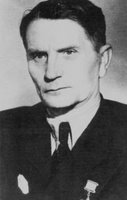 to new generations, which fitted the image of building a new Soviet Man - Homo Sovieticus. Coming from poor circumstances, Lysenko was just the "barefoot scientist" that the Communists needed to clamp down on and discredit "bourgeois science." Being a biologist, the obvious first target was genetics. Consequently, Lysenko started a campaign to eradicate genetical science in the Soviet Union, leading to a policy of political extermination of scientific opponents. Thus, in 1940, Nikolai Vavilov - as the most prominent geneticist of his time - was imprisoned for "bourgeois pseudoscience" and eventually died of malnutrition in jail in 1943.
to new generations, which fitted the image of building a new Soviet Man - Homo Sovieticus. Coming from poor circumstances, Lysenko was just the "barefoot scientist" that the Communists needed to clamp down on and discredit "bourgeois science." Being a biologist, the obvious first target was genetics. Consequently, Lysenko started a campaign to eradicate genetical science in the Soviet Union, leading to a policy of political extermination of scientific opponents. Thus, in 1940, Nikolai Vavilov - as the most prominent geneticist of his time - was imprisoned for "bourgeois pseudoscience" and eventually died of malnutrition in jail in 1943.Then, what about the SS-Commando for botanical collection? During Operation Barbarossa, the Nazi invasion of the Soviet Union, the SS-Commando was deployed to collect as
 much as possible of the plant samples from plant stations of the Vavilov institute throughout the USSR. Its mission resulted in the greatest theft in history of the genetic inheritance from a single nation. Samples were collected and brought back to the Third Reich for cultivation. Led by German botanist Heinz Brücher, who had long experience from expeditions to China and Central Asia, the Commando succeeded in gathering samples from most Vavilov plant stations in the USSR, though never being able to conquer the Vavilov institute itself in besieged Leningrad.
much as possible of the plant samples from plant stations of the Vavilov institute throughout the USSR. Its mission resulted in the greatest theft in history of the genetic inheritance from a single nation. Samples were collected and brought back to the Third Reich for cultivation. Led by German botanist Heinz Brücher, who had long experience from expeditions to China and Central Asia, the Commando succeeded in gathering samples from most Vavilov plant stations in the USSR, though never being able to conquer the Vavilov institute itself in besieged Leningrad.After the war, Brücher escaped to Latin America, where he continued his research. As the Cold War began, focus turned away from Nazi crimes and Brücher could gradually regain his position as a revered scholar. In secrecy, he returned to Europe to collect the samples he had robbed from the Soviet Union and recultivated in Austria. In 1972, Brücher even became an expert on agriculture and biology for UNESCO. Rumour even has it that he visited the USSR and that the KGB then extorted him into handing over some of his research results along with plant samples he had once robbed the Soviet Union of.
As in many other cases with Nazi crimes, apologists have tried to belittle also this massive theft of genetic resources. Thus, Brücher is said to have saved the Soviet genetic heritage from certain destruction, as Lysenko's policy eventually would have been sure to eradicate the majority of genetic collections in the USSR regardless of the war. However, such speculations do not change the question of guilt. Brücher therefore goes down in history as the greatest genetical robber yet.
Perhaps as a sign of remorse, he used the last years of his life to develop the virus estalla - a virus that was intended to hit the coca plant, and thus cocaine production in Latin America. In 1991, Brücher was brutally murdered in his home in Argentina. There have been speculations that the murder was ordered by Colombian drug barons, fearing that his research results would threaten cocaine production.
Although the image of robbers carrying off entire botanical gardens, seems ludicruous at first thought, the Brücher SS-Commando was the first recorded case of "biopiracy" in history, and to this day also remains the largest.
In 1993, the United Nations adopted the Convention of Biological Diversity for the protection of the genetic heritage of all nations. To this day, however, drug and agricultural companies explore nature to find plants, which they can put to commercial use, developing new drugs or crops. Of course, the biggest unexploited genetic depositories are in developing countries, which themselves are candidly bereft of their resources. Some things never seem to change.
Perhaps, the Monty Python hero of Dennis Moore has greater relevance today than ever - "taking from the rich - giving to the poor" - the genetic heritage that history and present has taken from the poor and helpless. This is equally true for the peoples of the Soviet Union in history as it is for the peoples of developing countries today. So, hand over the lupins!
Reading recommendations:
"Potatisens genetiske revolutionär" Svenska Dagbladet, 1 December 2008.
"Sovjetisk frösamling hett krigsbyte", Svenska Dagbladet, 2 December 2008.


